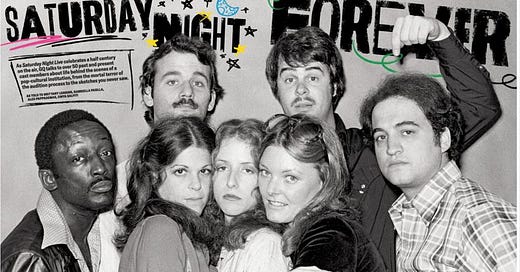Pop-culture superstar interactions on Saturday Night Live and a newer wacky sketch show you've got to see
Lorne Michaels often says that the best Saturday Night Live cast is the one that was on TV when you were in high school. That is certainly the case for me, as the 1984-85 season is by far my favorite. Martin Short, Christopher Guest, Billy Crystal, Mary Gross, Rich Hall, Gary Kroeger, Julia Louis-Dreyfuss, and Harry Shearer provided a magical season of pure-nutso comedy.
Although not many of them made it onto my recent list of top 10 favorite SNL performers, their performance overall was even better because they survived the Herculean task of overcoming Eddie Murphy’s exit in midseason the year before because he became too big of a movie star to still do SNL.
Anyway, I was reminded of all this as I read “Saturday Night Forever” in the March issue of GQ. I’m not adding this to my regular column, “Great Magazine Reads,” because it’s actually not that good of an article. But it does feel like an addendum to the very-good oral history book Live From New York. And there were a handful of interesting nuggets worth sharing.
Michaels, the show’s creator, added about the high-school comedy-discovery thing: “Discovering SNL around age 14—when you’re just juvenile enough for the dumb jokes and just cynical enough for the smart ones—is a rite of passage for anyone steeped in American pop culture.”
I totally don’t remember Tim Robinson as a cast member, which he totally was in the 2012-13 season. He’s one of the many former cast members interviewed in the article and I found his comments to be the most interesting, possibly because I just binge finished the three seasons of his own ultra-wacky sketch show on Netflix, I Think You Should Leave with Tim Robinson. Pro tip: seasons 2 and 3 are just as funny as season 1, which I reviewed, and a rumored season 4 may be in the works. His other TV comedy Detroiters and new film with Paul Rudd called Friendship are now very high on my to-watch list.
My favorite part of the GQ article is the one in which cast members highlight their favorite run encounters with superstar guests:
Paul Shaffer was in the band for from 1975-80 and a cast member in 1979–80. “Somebody had written a sketch that was going to precede the Rolling Stones’ first song, and I was going to be in it and I’m super excited. I’m in the makeup room and Mick kind of stumbles back there. He knows something that I don’t know yet, which is that Lorne has cut the sketch part at the very last minute. I’m looking at myself, getting so excited, and this is when I had my first conversation with Mick Jagger, which I’ll never forget. He kind of focused in on me. Then he said, ‘You’re cut.’ I’ll never forget, really, the magnificence of that conversation we had.”
Writer Robert Smigel said, “I got to write a sketch for Michael Jordan about the first Black Harlem Globetrotter. That was the joke—we pretended there was this guy, Sweet River Baines, played by Michael Jordan, who had broken the color barrier on the Globetrotters. We had a bunch of extras playing the original white Harlem Globetrotters. And I put myself in it, as one of those guys. Back in 1945, half the players were Jewish, and 5 foot 10, and not that good, so I checked every box. I took a very slow two-handed shot that he blocked so hard that it slammed against the wall of the gym. I have myself on film being blocked by Michael Jordan, and that’s a personal highlight for me.”
Garrett Morris, a cast member in the legendary years of 1975–80, said “ I was standing across from [Prince’s] dressing room. I didn’t even know he was there. I knew he was going to do the show, but I didn’t realize he was there. He opens the door, he sees me, and Prince very carefully walked over to me, reached out his hand, and said, ‘Garrett, thank you very much.’ And then he went back to his room. That’s something I’ll never forget.”
Cast member Jay Mohr said, “I introduced myself to Kurt Cobain and I said, ‘Hey, I’m Jay.’ And he said, ‘Are you a cast member?’ I said, ‘No, I’m a featured performer. I write mostly for other people.’ And I was feeling self-pity. And then he looked at me and said, ‘Wow, so you’re like a songwriter.’ And in that moment, I knew he would have traded places with me.”
And, finally, back to Tim Robinson: “I was walking through the halls with Buster, my son, and I saw Martin Short. Martin didn’t even look at me, just came up to Buster, who was maybe six, and said, ‘Who do you think is funnier—me or your dad?’ And my son said, ‘My dad.’ And he said, ‘Wrong answer.’ And walked away. He’s one of the funniest people of all time.”





